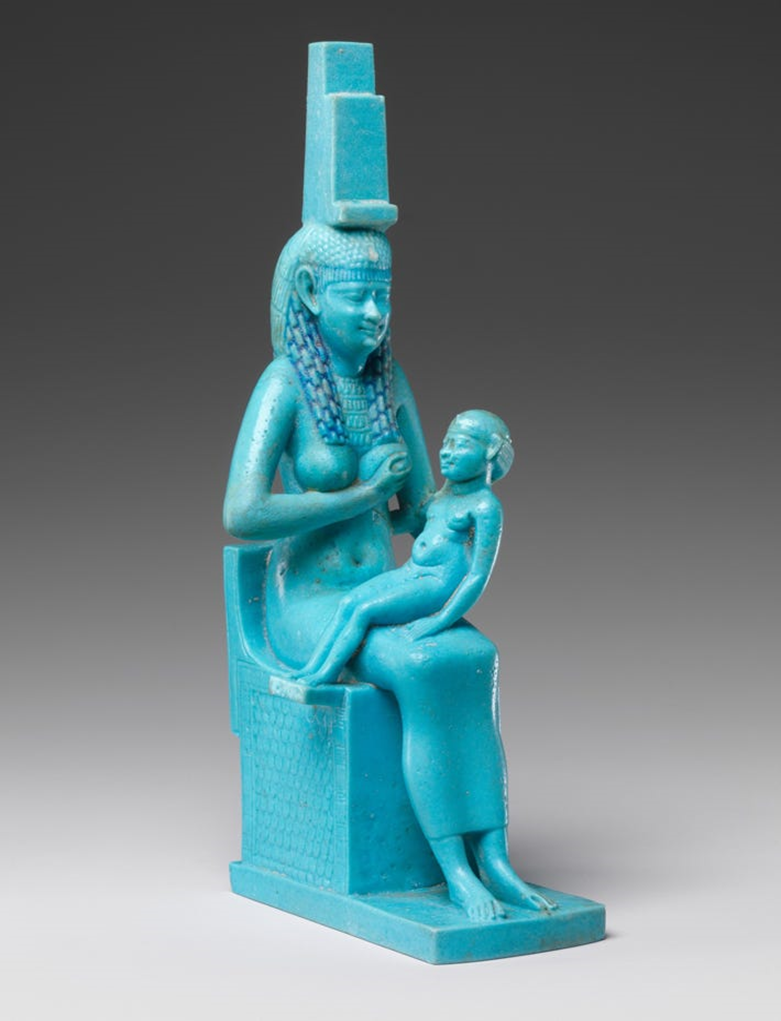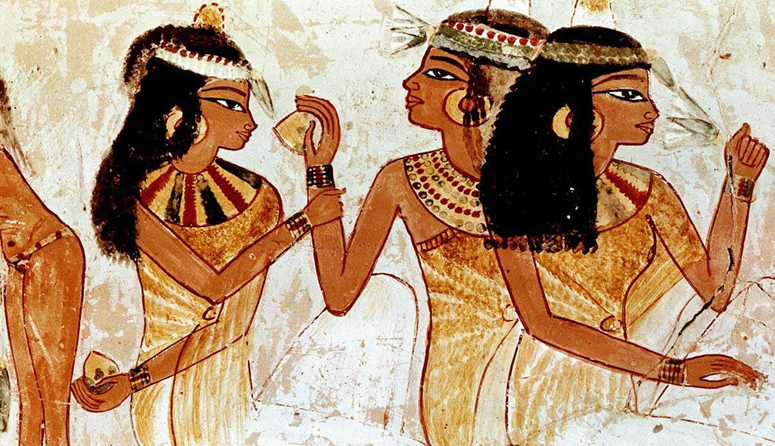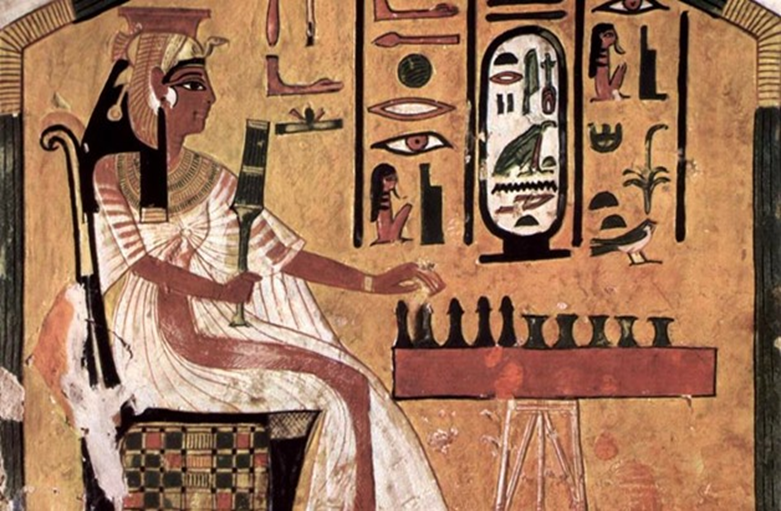The position of the mother in ancient Egypt

Before discussing the status of the mother in ancient Egypt and how to celebrate her, we must note that one of the most important human values in ancient Egyptian civilization is respecting the mother, appreciating her, and recognizing the importance of her role. She had a great status as the source of life and a symbol of warmth, tenderness, and sacrifice for the family. And her children.
The custom of honoring the mother began in ancient Egypt thousands of years ago with the beginning of the weaving of myths, where the ancient Egyptians imagined in their myths that the sky was a mother who gave birth to the sun every morning, and a large number of the ancient Egyptian gods were mothers, such as Isis, Nephthys, Nut, Hathor, and others. .
The ancient Egyptians called the mother “Nabet Bar,” meaning “housewife.” The mother in ancient Egypt had an influential and effective role in forming the family and ancient Egyptian society throughout its long history.
The status of the mother and women in ancient Egypt
The special status of women in ancient Egyptian society, especially the mother and wife, is considered one of the manifestations of ancient Egyptian civilization, which made the mother, wife, and daughter a symbol of equality. Women in ancient Egypt were described as “the unique, beloved, and unparalleled.”
Egyptian antiquities, including inscriptions, statues, texts, and literary heritage, testify to the sanctification, respect, and veneration of the mother in ancient Egypt. The antiquities that have come to us indicate that in ancient Egypt they appreciated and honored women, and celebrated them in celebrations similar to what happens on Mother’s Day these days.
We find tomb inscriptions, whether those of kings, senior statesmen, or the general public, all of which depict the owners of these tombs in the company of their mothers and wives in love and appreciation, out of their desire to appear with their mothers in their other world. Egyptian Pharaonic temples and tombs also contain touching scenes of motherhood and childhood. Such as the appearance of queens in ancient Egypt breastfeeding their children, just like common mothers, without any embarrassment in doing so. In those scenes, the ancient Egyptian symbolizes the intimate relationship between mother and child, without distinction between a queen, a princess, or a rich or poor lady.
The ancient Egyptians took a number of goddesses in their belief to express motherhood in its broad sense. The goddess Isis was considered a symbol of motherhood, and they often depicted her sitting and breastfeeding her son, Horus. There is the goddess Hathor, the goddess of motherhood and love, as well as the goddess Taoret, the goddess Nut...etc.
Religious literature in ancient Egypt embodied the oldest known role of the Egyptian mother on the banks of the Nile, in the story of Isis and Osiris, in which they narrated the sacrifices of Isis and what she endured in order to raise her son Horus after the death of his father, Osiris, and how she remained loyal, and how she made many sacrifices for Raising her son Horus, and how she stood by him until he regained his father’s throne and took revenge on his killer.
The role of Isis in regaining the throne of her husband, Osiris
The story narrates in brief: that the god Osiris was a king over humans who ruled among the people justly and took care of their comfort, which aroused the hatred of his brother “Set,” who through trickery managed to throw his body into the river and usurp his throne. But Isis remained loyal to her husband, Osiris, so she continued searching for him until she found him, and with her magical powers, she was able to restore his soul to him for one night, and she landed on him like a female bird to carry from him a divine burden of someone who would regain his stolen kingdom.
Then Isis tried to hide from “Set” so that she could give birth safely, but “Set” found her and threw her in prison, so “Thoth,” the Lord of wisdom and knowledge, intervened to save her, as he helped her escape and advised her to go to the delta and hide there so that he would not see her. "six".
Isis began her long journey and disguised herself in many forms so that Set would not recognize her. Rather, she worked as a beggar so as not to draw attention to her or her magical powers, until she reached the jungles of the Delta, and there she gave birth to her son Horus in secret without anyone knowing his whereabouts. The dangers threatened the life of this child. But he always survived it thanks to his mother's vigilance and care.
Isis continued to sacrifice for her son Horus, and when Horus grew up and strengthened his strength, Isis intended that her son grow up strong and strong unlike other children, and she taught him the arts of war and fighting, and she always told him about his father’s status and virtue, and that he must avenge his father, who He was unjustly killed by his uncle.

When the boy, Horus, felt bad for himself, he went out to avenge his father from his uncle Set, and entered into many battles with him, and their battles took place throughout all of Egypt until Horus succeeded in the end in regaining his father’s kingdom. Here, Isis found that her role in the world of this world had ended, so she chose to leave. To the other world to stay with her husband, Osiris
There were also other goddesses in the ancient Egyptian faith who expressed and symbolized motherhood, including the goddess “Hathor,” about whom they said in their myths that the color of the twilight at sunset was nothing but the blood that Hathor bled in the birth of her son, “Ehi.”
Women in ancient Egypt were eagerly anticipating the occurrence of pregnancy in order to satisfy their natural feeling of motherhood. If the mother felt pregnancy symptoms, she would seek all means of care and care for her health and the health of her fetus, out of concern for the safety of the pregnancy and its successful completion.
Approaching the gods and goddesses to protect the mother and her child during pregnancy
Mothers also approached many of the gods and goddesses responsible for protecting the mother and her child during pregnancy and childbirth, such as:
The goddess Isis, the goddess of motherhood and breastfeeding.
The goddess Hathor is the goddess of love and motherhood.
As well as the goddess Tawert, the goddess of pregnancy and childbirth.
The deity is Bas, the Lord of joy and fun, who in the people’s belief kept evil away from the mother and her child.
The deity “Khnum” is the Lord of Creation, who forms the human body on the potter’s wheel and gives the newborn the breath of life.
And also the god Amun, whom they believed would relieve the pregnant mother of labor pain if she spoke his name.

The customs of the ancient Egyptians when labor occurs for a pregnant woman
One of the customs of the ancient Egyptians was that when a pregnant woman went into labor, they would place her in a room inside the house, where the pregnant woman would give birth while sitting cross-legged on special birth chairs called “birth chairs,” or she would give birth while standing with her torso straight, and she was surrounded by a group of midwives. They played the role of goddesses of pregnancy and childbirth.
After the birth process was completed, seven priestesses of the goddess Hathor would come. They called them the Seven Hathors. In order to give good news to the mother and prophesy to the newborn, good fortune and a long life. On the other hand, mothers in ancient Egypt were interested in taking all means to ensure good breastfeeding.
If the mother felt that her milk had dried up, she would resort to the medical methods available in her time as a treatment for this problem, out of concern for the health of her liver.
It was the custom of Egyptians in some eras for children to take their mothers’ names. The ancient Egyptians from various classes of Egyptian society were keen to depict their mothers on the walls of their tombs and appear with them and in their arms.
Queen Iahhotep and her role in the blessed war of liberation against the Hyksos
The ancient Egyptian civilization has preserved the names of many ideal mothers, who played a prominent role in ancient Egyptian history and were able to hold the reins in crucial moments of ancient Egyptian history, such as Queen Iahhotep, the mother of the two kings Kamose and Ahmose, who fought the blessed war of liberation against the Hyksos until Ahmose succeeded in Expulsion of the Hyksos from Egypt.
The great mother Iahhotep was the widow of King Seqenenre, who was martyred in one of the war battles against the Hyksos, so Iahhotep took over the reins of power. She pushed her son, King Kames, into the battlefield after gathering the Egyptians around him to fight the battle of liberation, but Kames also died a martyr on the battlefield, like his father, in his early youth.

But the steadfast and patient mother pushed her second son, Ahmose, to lead the battle, when he was a boy under twenty years old. She instilled morale in the souls of the Egyptians, declared a state of general mobilization, gathered the crowds, addressed them, breathed into them her spirit, and advised her son Ahmose not to return except with wreaths of victory. .
Ahmose left with his blessed army from Thebes (Luxor), marching towards the Hyksos, chasing them. A terrible battle took place around the Hyksos capital, in which the Egyptians were valiant. They were able to crush the Hyksos, expel them from the land of Egypt, and disperse them, and they did not exist in history after that.
Ahmose's veneration of his mother, Eahhotep, because of the mother's status in ancient Egypt
Ahmose returned crowned with wreaths of victory, just as his great mother, Eahhotep, had instructed him to do. Ahmose did not forget the merit of his great mother in achieving victory, so he awarded her the Golden Fly Medal in recognition of her courage and steadfastness, and in recognition of her wonderful role. This medal was the highest military decoration in ancient Egypt and was given to strong fighting men. She thus became the first woman in history to be awarded a military medal.
Ahmose also called on people to glorify and sanctify his mother, and when God passed away, he gave her in her tomb a golden war ax engraved with his name as an expression of her military nature, and in gratitude for her military role. He also gave her bracelets and gold jewelry in appreciation for that ideal mother. The ancient Egyptians sanctified Aahhotep and preserved her biography for many centuries. .Queen T
There is also the great Queen Ti, the mother of the philosopher-king Akhenaten, the advocate of monotheism, and the wife of King Amenhotep III. Ti was characterized by reason and wisdom, along with severity and firmness, and she was able to balance matters in the country and curb the civil war and internal division as a result of her son Akhenaten’s new religious call, as well as She stood with her son in his religious call for monotheism.
Wisdom literature pays attention to the status of the mother in ancient Egypt
Wisdom literature in ancient Egypt was concerned with the status of the mother, and urged good treatment of her, reverence for her, and attention to the needs of women in general, because they were mothers or projected mothers. Some of the wise Egyptians even said, “The prayers of children do not reach the ears of heaven unless they come out of the mouth of God.” “Mothers.”

All the wise men instructed their children to respect their mothers, and among the commandments of the wise men during a son’s marriage was that he should treat his wife as he treats his mother.
The Wise Ani papyrus, which values the status of the mother in ancient Egypt
One of the most beautiful examples that expressed the ancient Egyptians’ appreciation for the mother and her role in life is what was mentioned in the papyrus of the sage Ani, who lived in the sixteenth century BC, advising his son by saying:
“Obey your mother and respect her, double the food you allocate for her, and bear with her as she bore you, for God is the one who gave her to you. She carried you in her womb a heavy burden that she carried alone, without help, and when she gave birth to you, she served you with all tenderness, and breastfed you for three years, and endured harm.” Your filth is without a breath, and when you joined school to learn, it would come to you every day with food and drink, and if you grew up And you got married and settled in your home, so remember your mother who gave birth to you and worked to raise you in every way... Do not let her blame you and raise her hand to God, so He will hear her complaint.”
Mother's Day among the ancient Egyptians
Hence, the ancient Egyptians made it a Mother’s Day, to celebrate, celebrate, and honor her. A papyrus dating back to the Old Kingdom about five thousand years ago was found, in which the mother is celebrated.
The Egyptians chose the date for celebrating Mother’s Day, the last month of the Nile flood, when the fertile land is prepared for sowing seeds, that is, the time of natural fertility in Egypt. It is the month of “Hator” in the ancient Egyptian calendar, and Hathor is a corruption of the name of the goddess “Hator,” who is the goddess of beauty. And motherhood, and the meaning of Hathor (Hath - Hor), meaning the wet nurse of Horus, meaning the wet nurse of the god Horus.
The ancient Egyptians likened the mother to the Nile River, which gives life, fertility, goodness, and growth. Mother’s Day was celebrated with the rising of the sun, whose light and rays they considered a message from the god of heaven to participate in congratulating her.
On that day, they would place gifts and sacred statues for the mother in her room that expressed motherhood. They considered the statue of “Isis,” carrying her son Horus, a symbol of motherhood and a symbol of Mother’s Day. So they would place it in the mother’s room, surrounding it with flowers and offerings, and placing around it sacred gifts for the mother on her feast. It was found in many From the tombs of the New Kingdom, there are many papyri and ostraca that contain examples of texts for the mother on her feast.
One of the papyrus on Mother's Day
It was stated in one of the papyrus: “Today is your feast, Mother. The sun’s rays have entered through the window to kiss your forehead and bless your feast day. The garden birds woke up early to sing for you on your feast, and the sacred lotus flowers have bloomed on the surface of the lake to greet you. Today is your feast, Mother, so do not forget to pray.” Please keep me in your prayers to the Lord.”
Source: websites

